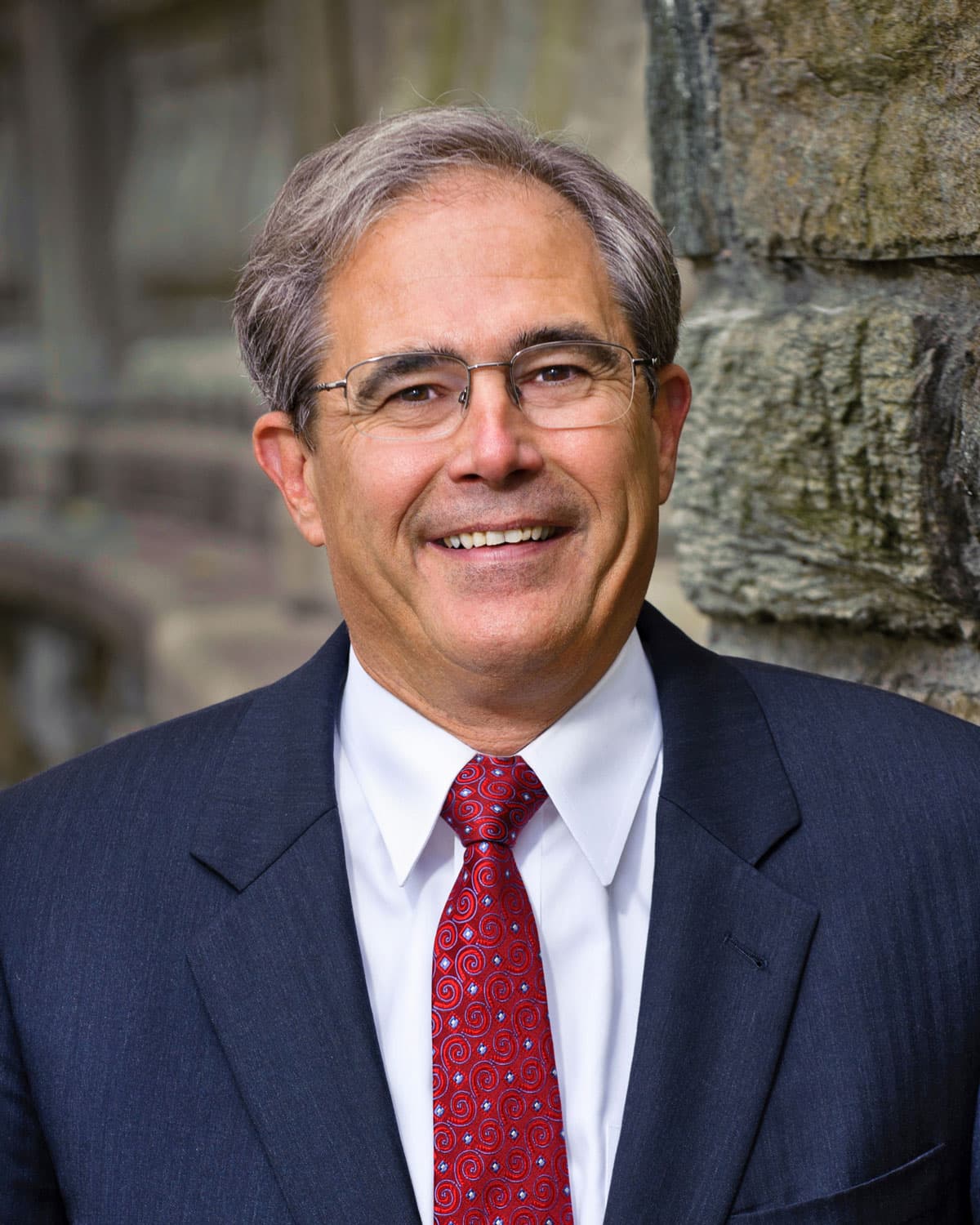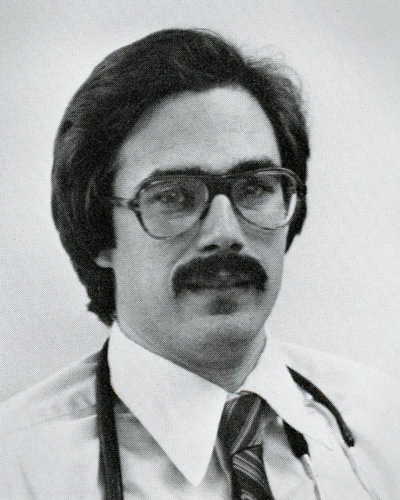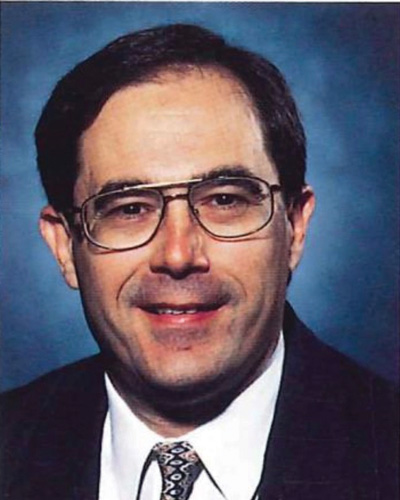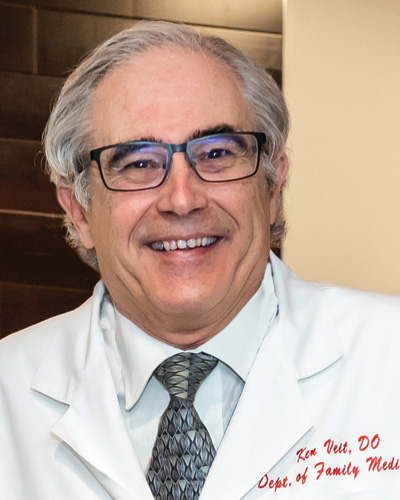The Longest-Tenured Dean
Kenneth J. Veit, DO ’76, MBA, FACOFP
February 16, 2023By Jennifer Schaffer Leone
In June, Kenneth J. Veit, DO ’76, MBA, FACOFP, announced that he was relinquishing his role as dean after determinedly leading
his alma mater through three decades, meaningfully shaping the osteopathic profession.
His was the longest deanship in the College’s history, spanning 30 years from 1992
to 2022. His deanship is likewise the longest in osteopathic history, according to
the American Association of Colleges of Osteopathic Medicine.
Dr. Veit, who will retain his title of provost and senior vice president of academic
affairs and continue as a family medicine professor and clinical provider, sat down
with the editor of Digest Magazine to reflect on this historic distinction, offering
wisdom and wit. His thoughts are especially apt as the College moves toward its 125th
anniversary.
May Your Sails Be Taut (But Not Too Taut)
“There is always a bit of a schism between an institution’s history, growth and need
for change. As dean, you manage, in many ways, the forward motion. This act requires
balancing the dynamic tension between academic and administrative leadership, priorities
and goals.
The work is akin to sailing. The challenge is the tensioning of the sail. The sail
must be taut enough so that the luff is not flapping, but not so taut that the wind
is blowing against one side, making the boat heel over. All of this occurs in constantly
changing waters.
Positioning your sail requires resiliency. The deanship requires adaptability. It
requires sensitivity, diplomacy and a commitment to finding commonality. In both cases,
you must check your arrogance at the dock.
Maneuvering 30 years of internal and external challenges confronting medical education
has been exciting. PCOM stands on the shoulders of many great leaders. Our College
has seen stability and success; there have also been times of sacrifice. We must continue
to be resilient, to be creative and challenge ourselves as the healthcare environment
ever advances. PCOM is well positioned to lead into the future if we remember who
we are. We have to be comfortable in our skin.”
The White Coat Keeps Your Perspective
“I started my medical career in the National Health Service Corp working in Orbisonia,
a rural community located in the borough of Huntingdon County, Pennsylvania. As a
young physician, caring for an underserved healthcare community appealed to my altruistic
senses. Through the experience, I acquired the broad-based knowledge of a generalist
and the flexibility to address the unexpected. I was also able to interface with and
teach many medical students while on this assignment.
I pledged early on to enjoy the humanity of my patients and vowed to meet my patients
where they are. My white coat continues to remind me of the importance of being humble
and making human connections.
My consistent but limited clinical role during my deanship has been vital. It allows
me to experience—firsthand—the struggles of the College’s faculty and graduates delivering
direct care, to taste the complexity of the evolving delivery system. It also helps
me to better collaborate efforts to integrate education, research and clinical care. I have never seen myself as a dean-figurehead; I have always wanted faculty and
students to recognize that I understand their work and I do it alongside them.
Perhaps, most important, has been the access my white coat has given me. Wearing it,
I meet real PCOM students in the clinics. As dean, you often encounter the students
at the extremes. But the best way to know the mainstream students—90 percent of the
student body—is in the clinics.”
The Osteopathic Quotient
“During the past three decades, osteopathic physicians have increasingly assimilated into mainstream medicine. Many DOs no longer employ
the consistent practice of OMT (often because of reimbursement barriers and many other factors). For younger physicians,
a single accreditation system for graduate medical education further amalgamates the professions and confounds identities.
Yet I have ascertained, perhaps retrospectively, that it is what I call our OQ or
Osteopathic Quotient that makes—and will always make—our profession unique. One’s
OQ is not defined by a modality or procedure. Rather, it is defined by how DOs—regardless
of discipline or specialty—interact with patients as a whole and in accord with our
osteopathic tenets.
OQ is embedded in how one thinks. It is physically manifested in one’s knowledge of
and respect for the musculoskeletal system. DOs are educated with the mandate of touch.
It is what we do naturally. It is the context for our clinical reasoning.
A surgeon reaching for a patient’s hand before going into the OR is so rare in today’s
realm of medicine, but not if the physician is a DO …
Touch is a primal and powerful act. It is an affective aspect of care. Touch is a
form of connection, an expression of presence. And this connection—between a DO and
patient—is trust. No matter what else medicine tries to substitute, hands on the patient
is essential.”
Essential Qualities of a Dean
“A dean must be first and foremost, authentic. You must bring your whole self to the
job. You must participate fully—and with empathy, patience and humor.
You must prioritize the pressure and seek proper perspective. You must understand
enough to know that you don’t have the answer for everything (practice as a generalist
clinician who is willing to call in the specialists, find the resources).
You must pick your battles carefully and try your best not to take the issues home
with you.
You must be cognizant of your role while understanding that you are not the most important
person in the room; you are one of many. The whole is greater than the sum of its
parts and a college is a special community.
You must appreciate each day—feel blessed and grateful—for the opportunity to serve
in this unique role.”
About Digest Magazine
Digest, the magazine for alumni and friends of Philadelphia College of Osteopathic Medicine,
is published by the Office of Marketing and Communications. The magazine reports on
osteopathic and other professional trends of interest to alumni of the College’s Doctor of Osteopathic Medicine (DO) and graduate programs at PCOM, PCOM Georgia and PCOM South Georgia.

 In June,
In June,  “I started my medical career in the National Health Service Corp working in Orbisonia,
a rural community located in the borough of Huntingdon County, Pennsylvania. As a
young physician, caring for an underserved healthcare community appealed to my altruistic
senses. Through the experience, I acquired the broad-based knowledge of a generalist
and the flexibility to address the unexpected. I was also able to interface with and
teach many medical students while on this assignment.
“I started my medical career in the National Health Service Corp working in Orbisonia,
a rural community located in the borough of Huntingdon County, Pennsylvania. As a
young physician, caring for an underserved healthcare community appealed to my altruistic
senses. Through the experience, I acquired the broad-based knowledge of a generalist
and the flexibility to address the unexpected. I was also able to interface with and
teach many medical students while on this assignment. “During the past three decades,
“During the past three decades,  “A dean must be first and foremost, authentic. You must bring your whole self to the
job. You must participate fully—and with empathy, patience and humor.
“A dean must be first and foremost, authentic. You must bring your whole self to the
job. You must participate fully—and with empathy, patience and humor.